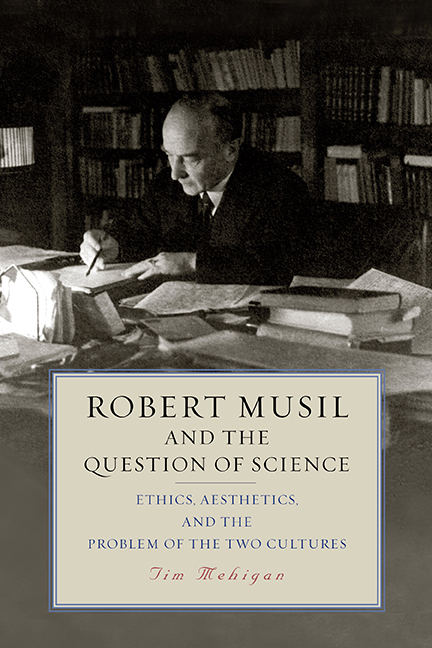Book contents
- Frontmatter
- Contents
- Preface
- Introduction: Musil’s Intellectual Position
- Part I Musil and the Two Cultures
- Part II Aesthetics and Ethics in the Context of the Two Cultures
- Conclusion: “A General Secretariat of Precision and Soul”: Ethics, Knowledge, and Literature after the Fourth Revolution 149
- References
- Index
Conclusion: “A General Secretariat of Precision and Soul”: Ethics, Knowledge, and Literature after the Fourth Revolution 149
Published online by Cambridge University Press: 26 April 2020
- Frontmatter
- Contents
- Preface
- Introduction: Musil’s Intellectual Position
- Part I Musil and the Two Cultures
- Part II Aesthetics and Ethics in the Context of the Two Cultures
- Conclusion: “A General Secretariat of Precision and Soul”: Ethics, Knowledge, and Literature after the Fourth Revolution 149
- References
- Index
Summary
FEW WOULD DOUBT that the terms of knowledge have undergone a fundamental change in recent times. In the view of many scholars who have tracked this shift, we are currently journeying through a revolution that is changing the way we arrive at knowledge. This is not a revolution about what humans know, as with all three previous revolutions. In this latest revolution, a so-called “fourth revolution” in knowledge, knowing has moved in significant measure away from the agency of human beings on account of the technical contrivances that help us know things. Our knowing, on this view, is fundamentally altered by the machines we build—above all the digital computer. These machines become a factor in the generation of knowledge not least because they exist outside us and outstrip the innate capacity of human beings to arrive at knowledge on their own. As a result, the ideal of “unassisted human reason,” once cherished by the “philosophes” of the eighteenth century, no longer pays off. “Big data” is the headline of a front-page story whose backstory tells of how the vast memory and processing capacities of modern computational devices help us know things we would never otherwise come to know if left to our own devices—these devices being, say, the Kantian time-space parameters governing human perception and cognition and the schematism that helps us know things from the tiny molecules of proto-knowledge that our sensual hardware and our conceptual software make available to us.
The new aspect of this knowledge revolution is not anything that we now know differently—for example, according to a genealogy promoted by Floridi (2014), that the earth revolves around the sun and not the other way round (the first, Copernican, revolution), or that humans descended from apes as a result of the workings of the same processes of evolution that govern the emergence of every other life-form we encounter on earth (the second, Darwinian, revolution), or even that our wakeful consciousness is swamped by unconscious stirrings, attachments, and projections that further destabilize our capacity to have reliable “unassisted” knowledge of things (the third, Freudian, revolution).
- Type
- Chapter
- Information
- Robert Musil and the Question of ScienceEthics, Aesthetics, and the Problem of the Two Cultures, pp. 149 - 160Publisher: Boydell & BrewerPrint publication year: 2020

